talks about life in Hurst Hill and remembers his
father, Thomas Grainger. |
In my early days Hurst Hill was not much more than a village, standing in open fields where to-day there is nothing but houses. We could go for walks all over the fields and over Sedgley Beacon. Everyone left their doors wide open and, if they were out, would even leave a note on the door asking the bread man to go in and collect his money from the table. There was no locking up at night before you went to bed. There were only three or four gas lamps scattered around but you could walk safely round the streets at night. The industry in the village was mostly people working in shops in their back yards, making pots and pans and anything else out of metal.
We all lived in Rifle Street, father, mother, my brother Kenneth and me. I was christened Thomas Arthur. But as my father was Thomas too things got confusing, so everyone took to calling me by my second name, Arthur. I also had a sister, Iris, but sadly she died, aged only 11, in 1942. That was also the year I started work.
I went to St. Mary's School. We boys used to play around the village getting up to the sort of mischief boys have always got up to. One of our games was White Horse Kick Back. We chose someone by eeny-meeny-miny-mo and then backed him up to someone's front door. Then the rest of us stood in the street and chorused: "White horse, kick back!". The boy by the door then gave two back kicks on the door and he and the rest of us fled down the street before the irate householder found out who had tricked him. Another version of the game was to use a length of string to tie together two door knockers on opposite sides of the street, then knock on one of the doors. The owner would open his door, which would cause the string to pull on the opposite door knocker. With luck the first owner would shut his door before the other opened his, thereby causing the string to knock on the first door again. This, we hoped, would go on for a long time. One day we decided to do this on a full scale. We chose Lime Street in Hurst Hill for this operation and managed to tie together all the door knockers in the street. There was very little traffic on the roads in those days but just as we had finished a furniture van turned into the street and drove along the whole length, tripping every knocker as it went.
We used to scrump the occasional apple from the trees of Joe Hartland, the undertaker, even though there was a risk he would set his dogs on us. Joe was one of the better off people in the village but that did not stop him from waiting around until my father came by so he could beg a pinch of snuff from him. Many people took snuff in those days and so did Joe - but I don't think he ever bought any. As well as being an undertaker Joe used to make wooden patterns for Mobberley Bricks. He used to get us kids to carry the new or repaired patterns from his place up to Mobberley's, telling us we would get a penny for our trouble. But whenever we got to Mobberley's he would tell us he had his best suit on and so he had no change on him. We never did get paid.
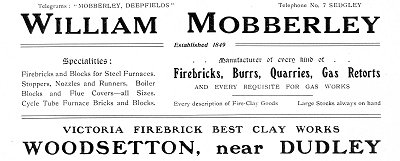
An advert for Mobberley Bricks from the Wolverhampton Chamber of Trade magazine for 1920.
Then when there was a funeral Joe would get us to push the wheeled bier up to the church, ready to take the coffin, and then back again after the service. He would always give us strict instructions not to ride on it. But we always did. He also told us we would get a penny for this work too. But we never got that either. No wonder Joe got rich.
My father worked in the rolling mills at Sankey's. It was always said he was very good at his job and he became a foreman. When pay day came round the company paid him and not the men in his team. He had to pay them. The work was not only hard but it was hot. The men all used to drink a lot of beer, simply to replace the fluids they had lost in the heat of the mills. The local pubs did well out of men like that. I once heard that our local vicar had gone in to one of our local pubs to try to draw his attention to the evils of drink. He asked the publican which customer he preferred, the one who sat there all night with a half of beer or the one who came in and drank 15 pints in quick succession. The publican said: "Neither, Vicar. I prefer the man who comes in, downs a quick half, and then puts two bottles in his pocket to take home. Just like you do".
It was a hard life in the mills and there were a lot of hard men around. My father used to tell me how, on Sundays, after the church service (and everyone went to church, though how much notice they took of the service I am not sure) two men would often put two maiding tubs (that you did the washing in) next to each other. Then one made would stand in each tub and they would fight each other. Some of their jokes at work were a bit rough too. My father told me how a new man appointed to cart things around the works in a barrow was very short. But his fellow workmen insisted his barrow was not big enough so they built up the sides. The result was that he could not see over the sides. So his fellow workmen would help him by giving directions. They would keep telling him to go forward a bit, forward a bit, until he and the barrow toppled over into the canal.
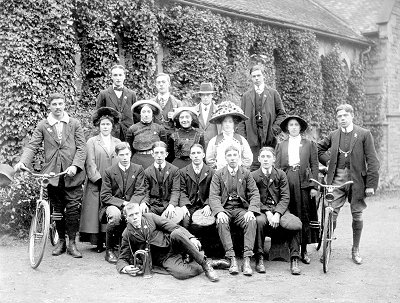 |
Even as young man my father had been keen on sports and other activities. This photo shows him and other members of the Hurst Hill Bicycle Club which was run from St. Mary's church. (My father is recumbent at the front with his bugle. The lad just above his head may be my Uncle Joe. The lady in the very big hat may be Mrs. Cadwallder, a grand dame of the district). It was all very properly organised and they all had club badges which you can see on their lapels. They also had a very complicated rule book which contained rules like the one saying that no one as allowed to cycle ahead of the club leader. If you did you had to pay a fine. If you swore you had to pay a fine. If anyone was straggling, my father was be called on to blow his bugle and, if the stragglers did not catch up in the time allowed, they had to pay a fine too. My father's other job with the bugle was to announce the club's arrival in each town or village they came to. I think the idea was that the local tea shop would know to get the tea ready. But the local pub would also know to get a few rounds ready. The club used to do day trips to places like Bridgnorth but they also did longer runs. They would ride to somewhere like Llangollen one day; spend the second day in and around Llangollen; and then ride back on the third day. And all on heavy, old fashioned roadsters. | 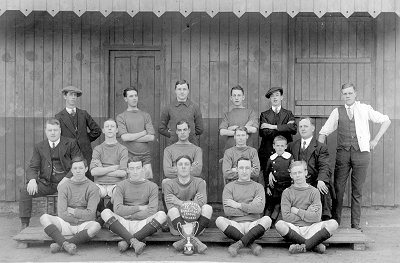
| My father was also involved in football. In this
photo he is the trainer, which you can tell by the fact that he has his
jacket off and a towel over his shoulder. On the football is written
"Woodsetton F.C. 1914-15 Bird's Cup and League Winners".
But most of his life he was involved with bowls. |
My Uncle Joe lost one arm during World War I when he was hit by an aircraft propeller. It ripped off one arm and gashed open the other from elbow to wrist. He was in hospital for 18 months. For a long time he was not allowed solid food. Then they told him he could eat solid food again. When the solid food turned up it was jelly!
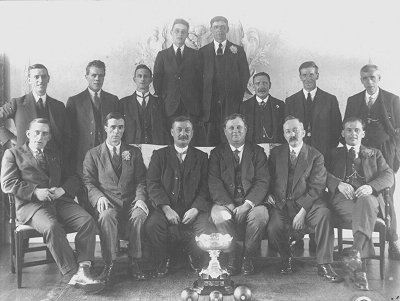 | The mount of this photograph has printed on it: The Peacock Bowls Challenge Cup Manor Works Team, Messrs. Joseph Sankey and Sons, Ltd. | 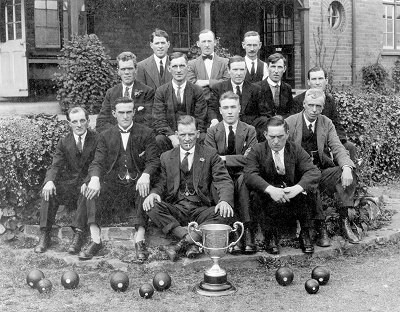 | This photo has handwritten captions: Sankey's Bowling Club J. Bromley M. Banks A. Bate |
Those two photos above are obviously of my father's works team. But the following photos show him in what seem to be other teams, probably pub teams. Many pubs in those days had bowling greens and my father was a keen player. He was also a good player and was said to be near county standard.
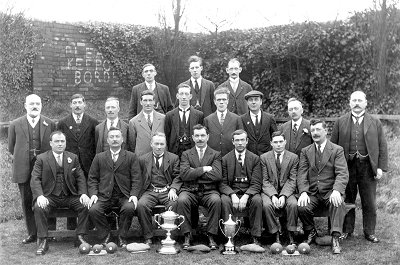 | In this photo my father is fourth from the right in the middle row. The man next to him has kept his cap on but those in the front row have taken them off and put them on the ground in front of them, along with the cups and bowls. Note the watch chains many of the men are wearing, with things hanging from them; the watch itself would be in a waistcoat pocket at one end of the chain. |
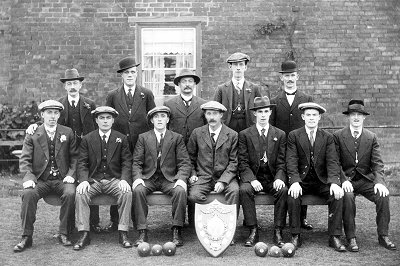 | Here my father is second from the left in the back row. He and one other man are wearing bowlers. That was the sign of a foreman. The working men are wearing flat caps. The ones in trilbies may have been office workers. In those days you carried your status symbols on your head. |
| In this one my father is in the middle of the front row behind the cup. I suppose he was team captain by then. But his bowler is still at the slightly rakish angle at which it appears in all the photos. | 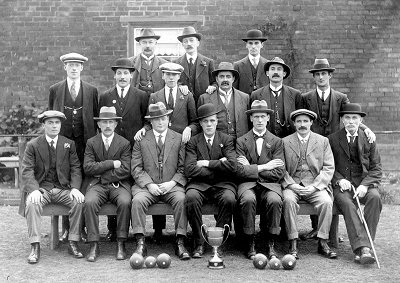 |